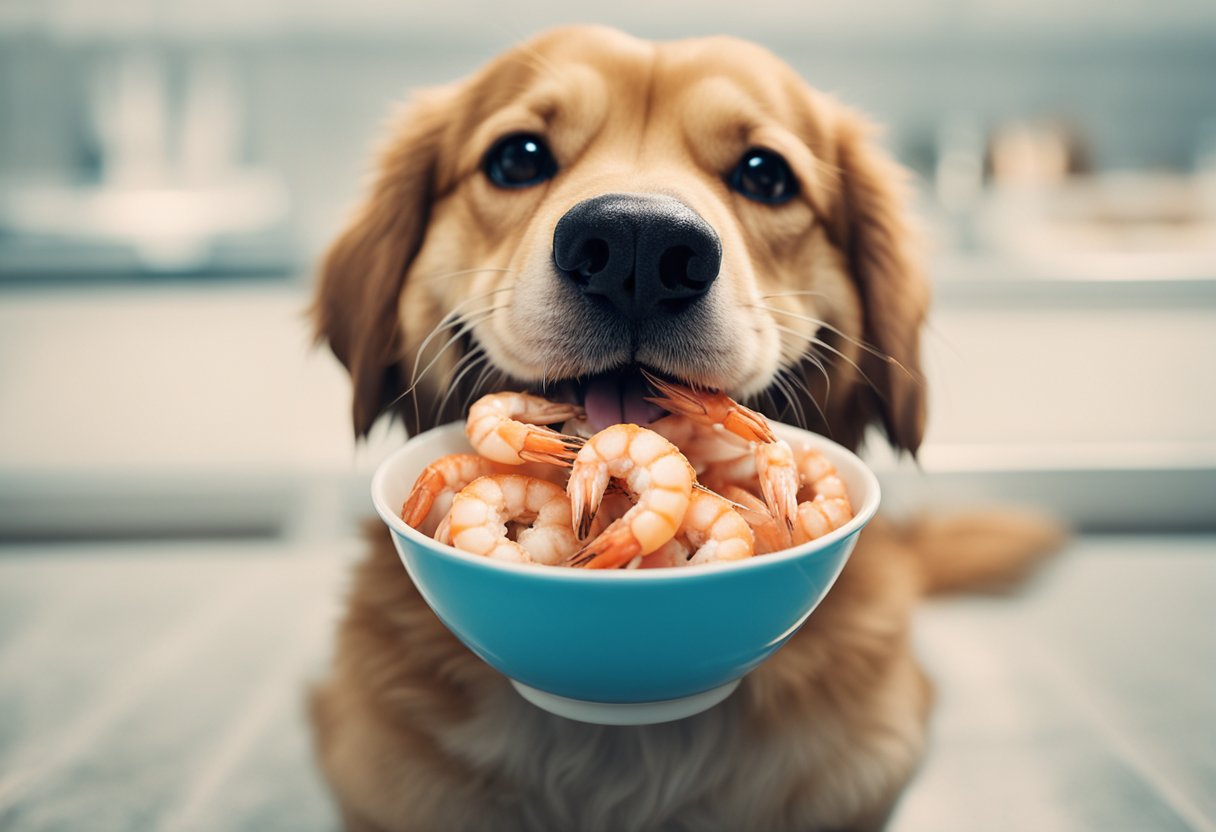Can Dogs Eat Shrimp? A Comprehensive Guide to Feeding Your Pooch Seafood
If you’re a dog owner and a seafood lover, you might be wondering if you can share your shrimp with your furry friend. The answer is yes, but with some precautions. While shrimp can be a healthy and nutritious treat for dogs, it’s important to be aware of the potential risks and how to safely feed them to your pup.

Shrimp are high in protein, omega-3 fatty acids, and B vitamins, which can be beneficial for your dog’s health. However, they are also high in cholesterol, so it’s important to feed them in moderation and consult with your veterinarian if your dog has any underlying health conditions. Additionally, it’s crucial to avoid feeding your dog raw, seasoned, or fried shrimp, as these can pose health risks to your pup.
Key Takeaways
- Shrimp can be a healthy and nutritious treat for dogs, but they should be fed in moderation and with caution.
- Avoid feeding your dog raw, seasoned, or fried shrimp, as these can pose health risks.
- Consult with your veterinarian before feeding your dog shrimp, especially if your dog has underlying health conditions.
Nutritional Benefits of Shrimp for Dogs

Shrimp is a type of seafood that is widely consumed by humans. But can dogs eat shrimp? The answer is yes, dogs can eat shrimp in moderation. Shrimp can provide several nutritional benefits to dogs, including protein, vitamins, minerals, and omega-3 fatty acids.
Protein Content
Shrimp is a good source of protein for dogs. Protein is an essential nutrient that is required for the growth and repair of cells, tissues, and muscles. According to the American Kennel Club, “shrimp is a high-quality protein source that is low in calories and fat, making it an excellent addition to your dog’s diet.”
Vitamins and Minerals
Shrimp contains several vitamins and minerals that are beneficial to dogs. For example, shrimp is a good source of vitamin B12, which is important for the proper functioning of the nervous system and the production of red blood cells. Shrimp also contains vitamin D, which is essential for the absorption of calcium and phosphorus, and vitamin E, which is an antioxidant that helps to protect cells from damage. In addition, shrimp is a good source of minerals such as zinc, copper, and selenium, which are important for maintaining a healthy immune system, promoting wound healing, and supporting the growth and development of bones and teeth.
Omega-3 Fatty Acids
Shrimp is a good source of omega-3 fatty acids, which are essential for maintaining a healthy coat and skin, and supporting brain and eye development. Omega-3 fatty acids also have anti-inflammatory properties and can help to reduce the risk of certain diseases such as heart disease and arthritis.
In conclusion, shrimp can provide several nutritional benefits to dogs, including protein, vitamins, minerals, and omega-3 fatty acids. However, it is important to feed shrimp to dogs in moderation and to avoid feeding them raw or seasoned shrimp. If you have any concerns about feeding shrimp to your dog, it is best to consult with your veterinarian.
Risks and Precautions When Feeding Shrimp to Dogs

Shrimp is a healthy and nutritious food for humans, but can dogs eat shrimp too? The answer is yes, dogs can eat shrimp, but precautions should be taken to ensure their safety and well-being. In this section, we will discuss the risks and precautions when feeding shrimp to dogs.
Choking Hazards
Shrimp shells and tails can pose a choking hazard to dogs, especially small dogs. It is important to remove the shells and tails before feeding shrimp to your dog. Additionally, make sure to cut the shrimp into small pieces to prevent choking.
Allergic Reactions
While rare, some dogs may be allergic to shrimp. Symptoms of an allergic reaction include itching, hives, swelling, and difficulty breathing. If your dog experiences any of these symptoms after eating shrimp, seek veterinary care immediately.
Proper Preparation and Serving
When feeding shrimp to your dog, it is important to prepare and serve it properly. Cooked shrimp is safe for dogs to eat, but raw shrimp can contain harmful pathogens. Therefore, it is recommended to boil, steam, grill, sauté, bake, or broil the shrimp before feeding it to your dog. It is also important to remove the shell and tail, and avoid seasoning the shrimp with spices, butter, or oil.
In addition, shrimp should not be a staple in your dog’s diet. It should be given as an occasional treat, and should not make up more than 10% of your dog’s daily caloric intake. Too much shrimp can cause digestive upset, such as diarrhea or vomiting.
In conclusion, dogs can eat shrimp, but it is important to take precautions and serve it properly. Remove the shell and tail, cut it into small pieces, and avoid seasoning it. Cooked shrimp is safe for dogs, but raw shrimp can contain harmful pathogens. Finally, shrimp should not be a staple in your dog’s diet and should only be given as an occasional treat.
Resources

If you’re wondering whether dogs can eat shrimp, there are a few resources you can consult to learn more. Here are some helpful sources to get you started:
- The American Kennel Club provides a comprehensive guide on Can Dogs Eat Shrimp?. According to the AKC, steamed shrimp is the best option for dogs, as fried or breaded shrimp can contain unnecessary fats and oils that can be harmful. Additionally, moderation is key when adding any new food to your dog’s diet.
- Embarkvet offers an informative article on Is Shrimp Safe for Dogs or Puppies?. The article explains that dogs can have a shrimp food allergy, and symptoms of food allergies in dogs include vomiting, diarrhea, itchiness from hives, facial swelling, and in rare but serious cases, anaphylaxis. Always give new foods in small quantities and allow the dog to digest the food and watch for signs of an allergic reaction.
- Great Pet Care provides a helpful guide on Can Dogs Eat Shrimp?. The article recommends feeding dogs only cooked shrimp. Boiled, steamed, freeze-dried, or grilled shrimp without any butter, oil, or spices is the recommended preparation for dogs. It is okay to serve cooked shrimp warm or cold to your dog. Shrimp scampi is not a good snack for dogs because of the garlic, which is toxic to dogs, and the butter, which can cause digestive issues.
- If you’re looking for a quick summary of whether dogs can eat shrimp, check out The Dodo’s article on Can Dogs Eat Shrimp? And What Amount Is Safe?. The article states that dogs can eat shrimp if it is properly prepared and cooked and fed responsibly. Shrimp can be a healthy treat because it’s packed with beneficial vitamins and nutrients like phosphorus, B12, niacin, and antioxidants. It’s also low in fat and caloric.
These resources should give you a good idea of whether dogs can eat shrimp and how to prepare it for your furry friend. As always, it’s important to consult with your veterinarian before making any significant changes to your dog’s diet.
Conclusion

In conclusion, dogs can eat shrimp, but it should be given in moderation. Shrimp is a good source of protein, vitamins, and minerals that can benefit your dog’s health. However, there are some things to keep in mind before feeding your dog shrimp.
Firstly, make sure the shrimp is cooked thoroughly and served without any seasoning, oils, fats, or spices. Raw shrimp and shrimp cooked with these ingredients can be harmful to your dog’s health.
Secondly, remove the shell, tail, and digestive vein before feeding your dog shrimp. These parts can be difficult for your dog to digest and may cause gastrointestinal problems.
Lastly, consult with your veterinarian before introducing any new food to your dog’s diet. Your vet can provide you with specific recommendations based on your dog’s health status and dietary needs.
Overall, shrimp can be a healthy and tasty treat for your dog when given in moderation and prepared correctly. By following these guidelines, you can safely incorporate shrimp into your dog’s diet and provide them with a variety of nutrients to support their overall health and wellbeing.
Frequently Asked Questions

Is cooked shrimp safe for dogs to consume?
Yes, dogs can eat cooked shrimp that is free of seasoning. Shrimp is a good source of protein and contains certain nutrients, vitamins, and minerals that dogs need to live their best lives. However, it is important to remove the shell, tail, and digestive vein before feeding it to your dog.
What are the risks of feeding raw shrimp to dogs?
Raw, uncooked shellfish contain harmful pathogens that can cause food poisoning in dogs. Therefore, it is best to avoid feeding raw shrimp to your dog. Cooking shrimp thoroughly can help eliminate these harmful pathogens and make it safe for your dog to eat.
Can consuming shrimp tails be harmful to dogs?
Yes, consuming shrimp tails can be harmful to dogs. Shrimp tails can pose a choking hazard or injure the digestive system. Therefore, it is important to remove the tail before feeding shrimp to your dog.
How should I respond if my dog ingests shrimp shells?
If your dog ingests shrimp shells, monitor them closely for any signs of discomfort or digestive issues. In most cases, the shrimp shells will pass through your dog’s digestive system without causing any harm. However, if your dog experiences vomiting, diarrhea, or other symptoms, contact your veterinarian immediately.
Are shrimp heads a suitable treat for dogs?
No, shrimp heads are not a suitable treat for dogs. Shrimp heads can pose a choking hazard or cause injury to the digestive system. Therefore, it is important to remove the head before feeding shrimp to your dog.
What symptoms indicate a dog is having a reaction to shrimp?
If your dog is having a reaction to shrimp, they may exhibit symptoms such as itching, swelling, hives, vomiting, diarrhea, or difficulty breathing. If your dog experiences any of these symptoms after consuming shrimp, contact your veterinarian immediately.
